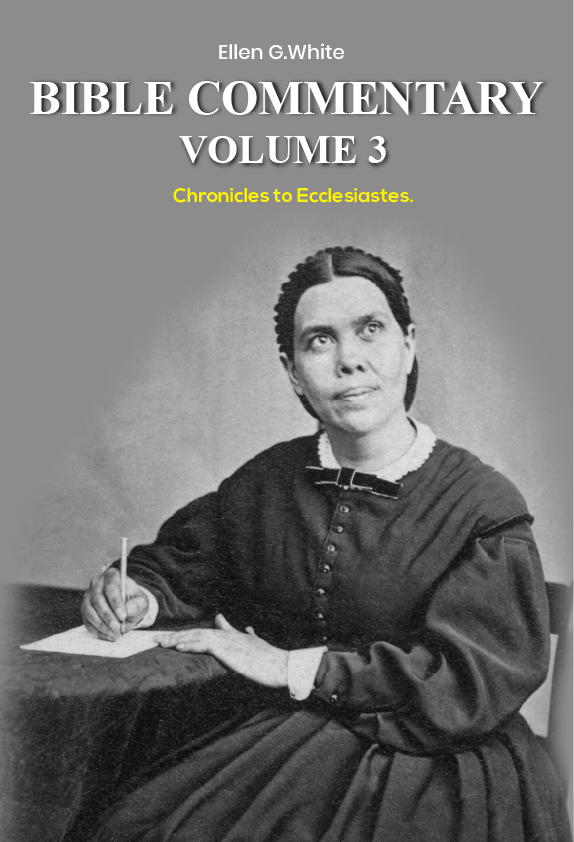Overview of E.G. White Comments, SDA Bible Commentary, Vol. 3
The third volume of the Seventh-day Adventist Bible Commentary series, which features Ellen G. White’s (EGW) inspired insights, spans from the biblical books of 1 Chronicles through Ecclesiastes. This commentary serves as a valuable resource for understanding the deeper spiritual meanings and practical applications of Scripture, as interpreted through White’s prolific writings.
The volume intertwines biblical exegesis with pastoral reflections, emphasizing themes such as God’s sovereignty, the role of faith, divine wisdom, and human accountability. White’s contributions provide spiritual depth and practical guidance, harmonizing with the Adventist focus on Christ’s redemptive work and the principles of holy living.
Key Themes and Highlights by Section
1 Chronicles and 2 Chronicles
The books of Chronicles recount the history of Israel and Judah, emphasizing God’s covenant faithfulness despite the nation’s frequent unfaithfulness. EGW’s commentary draws attention to God’s providence in selecting leaders, the importance of worship, and the consequences of disobedience.
- Leadership and Divine Calling: White underscores the critical role of godly leadership. She notes that leaders like David and Solomon were called by God but also cautions against their human weaknesses.
- Worship in Spirit and Truth: The detailed instructions for temple worship remind readers of the need for reverence and order in approaching God.
- Faithfulness vs. Apostasy: EGW illustrates the recurring patterns of revival and apostasy, urging modern believers to seek continuous renewal in their relationship with God.
Ezra and Nehemiah
These books highlight the restoration of Jerusalem following the Babylonian exile. White’s commentary focuses on themes of perseverance, prayer, and the importance of adhering to God’s law during times of rebuilding.
- Prayer as a Foundation: Nehemiah’s reliance on prayer before every major decision is a lesson in trusting God amidst challenges.
- Rebuilding and Reformation: EGW relates the rebuilding of Jerusalem’s walls to the need for spiritual reformation in the church today, emphasizing unity and collective effort.
- Courage Amid Opposition: The opposition faced by Ezra and Nehemiah serves as a parallel to modern believers who must stand firm in their convictions.
Esther
The story of Esther illustrates God’s providence and deliverance of His people in a foreign land. EGW uses this narrative to inspire trust in divine plans and courage in the face of adversity.
- Divine Providence: White highlights that God works through individuals, often behind the scenes, to accomplish His purposes.
- Moral Courage: Esther’s bravery in approaching the king is a powerful example of self-sacrifice and standing for what is right, even at great personal risk.
- Intercessory Role of God’s People: The role of Mordecai and Esther in advocating for their people mirrors the spiritual intercession believers are called to make.
Job
The book of Job grapples with the problem of suffering and God’s justice. EGW’s reflections delve into themes of faith, patience, and the ultimate triumph of God’s purposes.
- Faith Amid Suffering: White underscores Job’s unwavering trust in God, even when his circumstances seemed inexplicable.
- Satan’s Role as the Accuser: EGW explains that Job’s trials illustrate the cosmic conflict between Christ and Satan, with Satan accusing God’s faithful of serving Him out of self-interest.
- God’s Sovereignty and Wisdom: White emphasizes the grandeur of God’s response to Job, which reveals His infinite wisdom and the limitations of human understanding.
Psalms
The Psalms are rich in expressions of praise, lament, and trust. EGW’s commentary highlights the spiritual lessons embedded in these poetic writings.
- Heartfelt Worship: David’s psalms are praised for their sincerity, teaching believers to approach God with honesty and gratitude.
- The Messianic Psalms: White links prophetic psalms to the life and ministry of Jesus, portraying Him as the ultimate fulfillment of Israel’s hopes.
- God as Refuge and Strength: The psalms remind readers of God’s reliability and His readiness to comfort and defend His people.
Proverbs
Proverbs offers wisdom for daily living, emphasizing practical godliness and moral integrity. White’s insights reinforce the importance of aligning one’s life with divine principles.
- Godly Wisdom: EGW stresses that true wisdom begins with the fear of the Lord and contrasts worldly knowledge with spiritual understanding.
- Moral Purity: White discusses the dangers of succumbing to temptation and the blessings of living a life of integrity.
- Parental Guidance: The counsel given in Proverbs on raising children resonates with White’s own writings on family and education.
Ecclesiastes
Ecclesiastes reflects on the search for meaning in life. EGW’s commentary focuses on the futility of a life apart from God and the ultimate fulfillment found in Him.
- Vanity of Worldly Pursuits: White aligns with Solomon’s conclusion that earthly achievements and pleasures are meaningless without God.
- Fear God and Keep His Commandments: EGW emphasizes that true purpose and joy come from obedience to God and living in harmony with His will.
- Eternal Perspective: The transient nature of life points believers toward the eternal hope found in God’s promises.
Practical Applications for Modern Believers
Ellen White’s commentary in Volume 3 is rich in practical applications for contemporary Christians. Several themes resonate strongly with modern challenges:
- Faithful Leadership: Whether in church, home, or society, White’s reflections on the leaders of Israel encourage today’s believers to lead with humility and reliance on God.
- Trust in Divine Providence: The stories of Esther, Ezra, and Nehemiah remind readers that God is actively involved in the lives of His people, even when His workings are not immediately apparent.
- Spiritual Renewal: The cycles of apostasy and revival in Chronicles serve as a call to personal and collective repentance and renewal.
- Perseverance in Trials: Job’s story inspires unwavering faith amid suffering, reinforcing the promise that God’s plans are ultimately for good.
- Christ-Centered Worship: White’s reflections on Psalms and Proverbs call for worship that exalts God and transforms character.
Conclusion
Volume 3 of E.G. White Comments on the SDA Bible Commentary serves as both a theological guide and a devotional resource. By blending historical context, spiritual insight, and practical advice, White’s writings illuminate the timeless truths of Scripture from Chronicles to Ecclesiastes. This volume encourages believers to deepen their trust in God, align their lives with His will, and embrace the hope of His eternal kingdom.





